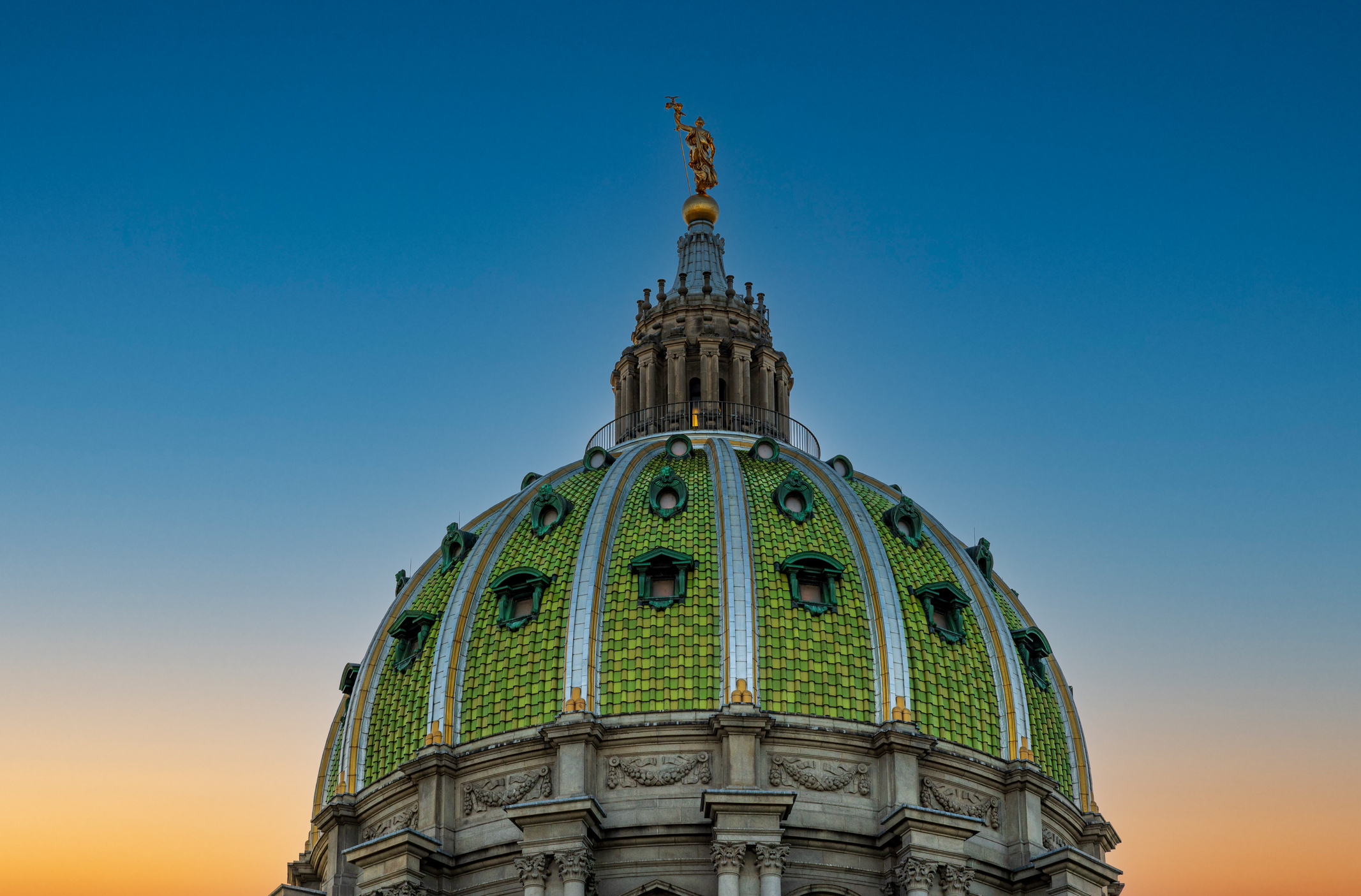What is a veto override?
This summer, DMGS looked at gubernatorial vetoes. To recap, in a state’s checks and balances system, governors maintain the power to veto legislation. Each state has laws and rules outlining the veto process, which varies from state-to-state. There are also numerous veto types, including line-item vetoes, amendatory vetoes, reduction vetoes, pocket vetoes, and full bill vetoes. Governors across the country have vetoed numerous pieces of legislation on several topics, some more than others.
While lawmakers in each state introduce a myriad of legislation, lawmakers advance any some bills through the legislative process; state governors then sign most but not all of those bills. Governors may veto some bills, but lawmakers can override a gubernatorial veto. Some veto overrides are successful, while others fail. This fall, 42% of state legislatures have veto-proof majorities, with Republicans having such majorities in 15 states and Democrats in six states.
Failed Veto Overrides
Pennsylvania
In Pennsylvania, Republicans maintain majorities in both the state House and state Senate, with Democratic Governor Tom Wolf. This has led to some tense battles as the Keystone State has wrestled with how to deal with the COVID-19 pandemic, with lawmakers attempting to override a handful of Governor Wolf’s vetoes in the last few months. Governor Wolf has vetoed 13 bills sent to his desk by lawmakers in 2020 alone.
In late September, Governor Wolf vetoed House Bill 2787, which would have provided that the governing authority of a school entity or nonpublic school would have had the exclusive authority to determine whether or not to hold school sports activities (i.e., competitions, intramural play, and scrimmages), and other in-person extracurricular activities during the current academic school year. This contrasts with Governor Wolf’s orders regarding school sports and the recommendation against holding school sports before the end of 2020. In Wolf’s veto message, he argued the bill was unnecessary because the recommendation was, in fact, a recommendation and not a mandate.
A 2/3 majority is needed in the House to override a gubernatorial veto. The House initially passed the bill by a vote of 155-47. If lawmakers held the same vote on a veto override, the override could have been successful. However, when lawmakers attempted to override the governor’s veto, they came up short with a 130-71 vote.
House lawmakers attempted to override another veto in October – this time House Bill 2513. HB 2513 would have allowed establishments (restaurants, bars, hotel, private club, brewpub, brewery, winery, distillery, etc.) to self-certify that they are utilizing 50% of their indoor seating capacity with social distancing consistent with CDC guidelines. Currently, establishments must apply for state certification that they are complying with public health guidelines. HB 2513 also permitted establishments to operate above the minimum 50% capacity under certain circumstances, up to pre-pandemic levels. The bill also would have provided that such establishments not be subject to an executive order during the COVID-19 emergency that would require meal purchases to buy alcoholic beverages and would prohibit bar service for food and beverage.
HB 2513 passed the House initially by a vote of 145-56, but the veto override vote failed with a 133-69 vote. Governor Wolf’s veto message indicated that the bill jeopardized public health and safety and would have increased the likelihood of COVID-19 outbreaks. Governor Wolf also noted that courts would have found the bill, like several previous bills, unconstitutional.
North Carolina
In 1996, North Carolina became the last state in the country to give its governor the power to veto legislation. While Republicans previously held veto-proof majorities in both legislative chambers, Democrats changed that following the 2018 elections. Republicans still maintain control of both chambers and have conflicted with Democratic Governor Roy Cooper over how the state should respond to the coronavirus.
Since April 2019, Governor Cooper has issued 25 vetoes and lawmakers have overridden none. However, lawmakers have tried. In July, lawmakers attempted to override numerous vetoes related to the state’s handling of the pandemic and one veto related to concealed carry within churches. The bills Governor Cooper vetoed, which lawmakers failed in their veto override attempts, include:
- Senate Bill 599 – failed by a vote of 26-21. The bill would have allowed skating rinks and bowling alleys to open and resume operations if they met certain conditions. The bill would have temporarily allowed minor league baseball stadiums to have outdoor seating up to 10% of the stadium’s permanent seating capacity if they met certain conditions.
- Senate Bill 105 – failed by a vote of 26-21. The bill would have required the governor to seek the State Council’s concurrence if issuing a statewide emergency declaration over 30 days. The bill also would have required the governor to seek the Council’s concurrence before imposing prohibitions or restrictions to deal with the emergency.
- House Bill 806 – failed by a vote of 63-51. The bill would have allowed indoor or outdoor exercise and fitness facilities, gyms, health clubs, and fitness centers to open and operate, assuming certain conditions were met.
- House Bill 686 – failed by a vote of 58-54. The bill would have prohibited an executive order or declaration from prohibiting either July 4th parades or regulated firework displays. The bill would also have prohibited a municipality or county from prohibiting a parade or firework display from being held on July 4th and would have limited the civil liability if someone contracted the coronavirus at a parade or firework display on July 4th.
- House Bill 652 – failed by a vote of 66-48. The bill would have allowed someone with a concealed handgun permit to possess and carry a handgun on an educational property that serves as a religious worship place. Current law prohibits any person from possessing or carrying any firearm on educational property or a curricular or extracurricular activity sponsored by a school.
In the veto messages for Senate Bill 599, Senate Bill 105, House Bill 806, and House Bill 686, Cooper echoed the sentiment that tying the hands of public health officials during a pandemic is dangerous and that officials must be allowed to take swift action during the pandemic to prevent spikes in cases of the coronavirus. Cooper also successfully argued that House Bill 652 would have allowed guns on school property and threatened students’ and teachers’ safety.
Successful Veto Overrides
Mississippi Veto Overrides
Mississippi lawmakers passed HB 1700 over the summer and Governor Tate Reeves partially vetoed it. The bill made appropriations for K-12 education funding and other educational activities and programs for FY 2021.
In the veto message, Reeves argued that the partial veto was necessary to ensure that Mississippi’s 23,000 teachers get the money owed to them under the School Recognition Program. The program is a bonus wage program for teachers in schools that maintain a high academic performance or have shown significant improvement. Without the partial veto, the bill would cut teachers’ wages. Despite the governor’s concerns, lawmakers overwhelmingly voted to override the partial veto. Both House and Senate legislative leaders said omitting funding for the School Recognition Program was an oversight and later introduced another bill to address the funding. Mississippi remains ranked as one of the worst states in education
Oklahoma Veto Overrides
Oklahoma is one of the 15 states where Republicans maintain a veto-proof majority.
Lawmakers passed Senate Bill 1922, the state’s general appropriations bill, by votes of 77-23 in the House and 36-11 in the Senate. The FY 2021 budget bill appropriated $7.7 billion, roughly 3% less than the FY 2020 budget. Facing a $1.4 billion budget deficit, lawmakers decided to use reserve funds, cut one-time spending, temporarily redirect non-appropriated money, and reduce agency appropriations by 4% or less across the board.
In the veto message for Senate Bill 1922, Governor Stitt argued that short-term, one-time funds that will not be available for FY 2022 would prop-up the bill’s funding. Stitt also noted that the budget bill would back the state into a corner financially and result in higher taxes, large budget cuts, or higher debt payments in 2022. The House and Senate voted to override the Senate Bill 1922 veto. The Senate vote was 35-11, while the House vote 79-20.
Lawmakers have further voted to override 10 out of 19 vetoes by Governor Kevin Stitt as of May, the most in recent Oklahoma history. Vetoes overridden have been on bills related to the budget, rural broadband access, government contracts, tag agencies, and higher education.
Kentucky Veto Overrides
Like Oklahoma, Kentucky Republicans have a veto-proof legislative majority. Unlike Oklahoma, Kentucky’s governor, Andy Beshear, is Democratic. In April, Governor Beshear issued line-item vetoes for parts of five budget bills. Beshear noted that he made no vetoes of specific appropriations, but only to language, which limited flexibility to respond to the COVID-19 pandemic. The Republican House Budget Chair, Steve Rudy, disagreed that the bills restricted the governor’s flexibility, noting lawmakers would work in tandem to combat the coronavirus.
Before the conclusion of the 2020 legislative session, lawmakers voted to override vetoes of four budget bills. The exception was HB 356, the judicial appropriations bill. The vetoes overridden included:
- Language establishing a renewable chemical tax credit;
- Language related to computer services the governor said would cause harm to the administration’s efforts to deal with an unemployment claims spike;
- Language to abolish the requirement that government agencies publish legal notices in large newspapers; and
- Language requiring that the state secretary must approve of any changes that the governor might make to an election during a state of emergency.
Lawmakers also passed an anti-abortion bill before the end of the session, which Governor Beshear vetoed. Senate Bill 9 would have:
- Prohibited a person from denying or depriving a born-alive infant of nourishment with the intent to cause or allow the death of the infant;
- Prohibited a person from denying or depriving a born-alive infant of medically appropriate and reasonable medical care, medical treatment, or surgical care;
- Required a physician performing an abortion to take all medically appropriate and reasonable steps to preserve the life and health of a born-alive infant; and
- Provided that a born-alive infant be treated as a legal person.
In the veto message, Governor Beshear noted that existing Kentucky law fully protects children from being denied life-saving medical care and treatment at the time of birth. The governor also noted that courts have already repeatedly deemed similar bills in other states unconstitutional.
The governor vetoed Senate Bill 9 after lawmakers adjourned, so lawmakers did not attempt any veto overrides.
Latest News
Photo credit: iStock.com/sommart In 2025, state governments across the U.S. are advancing initiatives to improve administrative efficiency and modernize civil service, adopting tailored strategies to better serve residents. Recognizing the importance of adaptability, innovation, and [...]
Photo credit: iStock.com/BackyardProduction Governor Josh Shapiro delivered his 2025-26 budget address, outlining economic initiatives, public safety measures, infrastructure improvements, and education funding. His speech emphasized continued investment in key sectors to strengthen Pennsylvania’s [...]
Photo credit: iStock.com/Naypong The rise of Name, Image, and Likeness (NIL) rights has revolutionized collegiate athletics, empowering student-athletes to monetize their personal brands while maintaining eligibility, something we previously covered in 2023. Since California's groundbreaking [...]
Photo credit: iStock.com/runna10 Every year in the United States, a growing number of teachers leave their positions. While there are multiple reasons for this alarming trend, many teachers point to inadequate compensation as a significant [...]






Stay In Touch